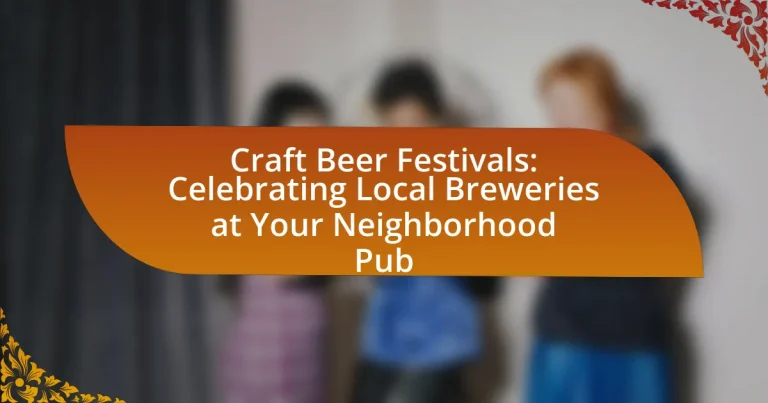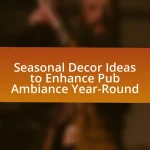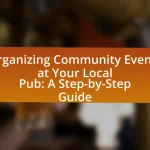Craft beer festivals are events that highlight and celebrate the diverse offerings of local breweries, providing attendees with opportunities to taste various craft beers, enjoy food pairings, and engage with brewers. These festivals play a crucial role in promoting local breweries by increasing visibility and sales, fostering community engagement, and enhancing the craft beer culture. Attendees can expect a well-organized layout featuring tasting sessions, live entertainment, and educational workshops, all designed to enrich their understanding and appreciation of craft beer. Local pubs can also benefit from hosting these festivals through increased foot traffic and strengthened partnerships with breweries, ultimately contributing to the local economy.
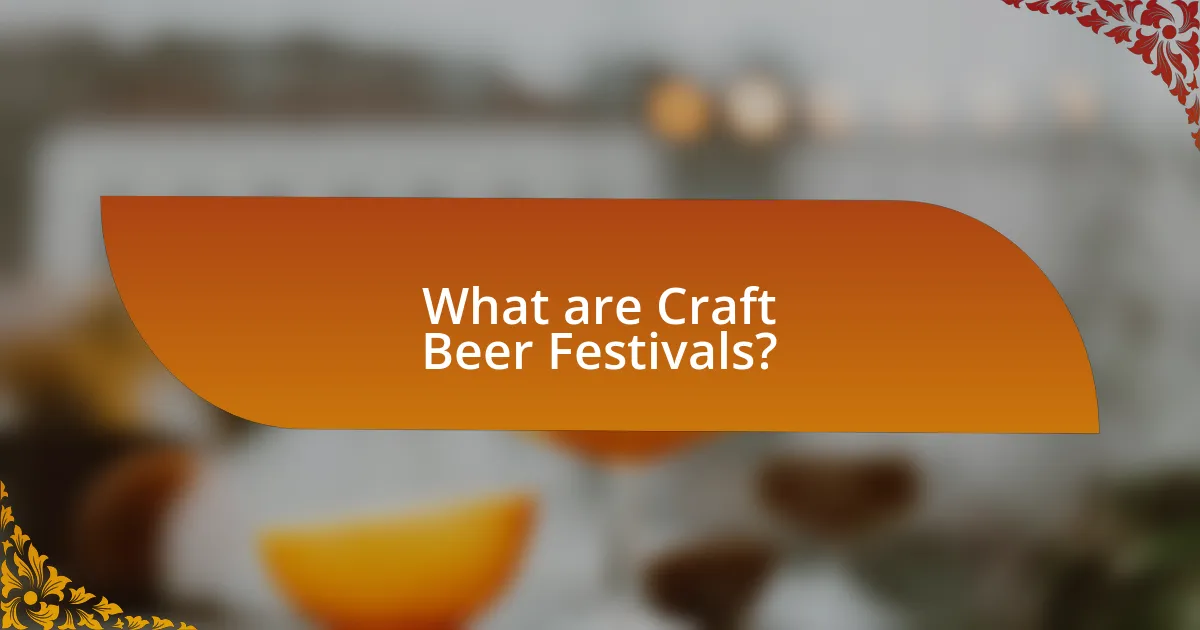
What are Craft Beer Festivals?
Craft beer festivals are events that celebrate and showcase a variety of craft beers produced by local breweries. These festivals typically feature tastings, food pairings, and opportunities for attendees to meet brewers and learn about the brewing process. According to the Brewers Association, craft beer festivals have grown in popularity, with thousands of events held annually across the United States, highlighting the increasing consumer interest in unique and locally sourced beer options.
How do Craft Beer Festivals promote local breweries?
Craft beer festivals promote local breweries by providing a platform for them to showcase their products directly to consumers. These events attract large crowds, allowing breweries to gain visibility and connect with potential customers. According to the Brewers Association, craft beer festivals can significantly increase local sales, as they often lead to a rise in taproom visits and retail purchases following the event. Additionally, festivals foster community engagement, encouraging attendees to support local businesses and explore the unique offerings of nearby breweries.
What role do local breweries play in Craft Beer Festivals?
Local breweries are central to Craft Beer Festivals as they provide a diverse range of unique and locally produced beers that showcase regional flavors and brewing techniques. These breweries often participate by setting up booths to offer tastings, allowing attendees to sample their products and engage directly with the brewers. This interaction fosters community engagement and supports local economies, as Craft Beer Festivals typically attract large crowds, boosting sales for participating breweries. Additionally, local breweries contribute to the festival’s educational aspect by hosting workshops and discussions about brewing processes, beer styles, and food pairings, enhancing the overall experience for attendees.
How do festivals enhance community engagement with breweries?
Festivals enhance community engagement with breweries by providing a platform for local breweries to showcase their products and connect with consumers. These events foster a sense of community by bringing together residents, encouraging social interaction, and promoting local culture. For instance, craft beer festivals often feature local food vendors, live music, and activities that create a festive atmosphere, which attracts diverse groups of people. According to a study by the Brewers Association, craft beer festivals can increase local brewery sales by up to 30% during the event, demonstrating their effectiveness in driving community interest and support for local breweries.
Why are Craft Beer Festivals important for beer enthusiasts?
Craft Beer Festivals are important for beer enthusiasts because they provide a unique opportunity to sample a diverse range of local and craft beers in one location. These festivals often feature numerous breweries, allowing attendees to explore various styles and flavors that may not be available in their local markets. Additionally, they foster community engagement by connecting beer lovers with local brewers, promoting the craft beer culture, and supporting small businesses. According to the Brewers Association, craft beer sales have grown significantly, indicating a rising interest in local breweries, which festivals help to highlight and celebrate.
What unique experiences do Craft Beer Festivals offer?
Craft Beer Festivals offer unique experiences such as direct interaction with local brewers, diverse tastings of craft beers, and educational sessions on brewing techniques. These festivals create an immersive environment where attendees can sample a wide variety of beers, often featuring exclusive or limited-edition brews that are not available elsewhere. Additionally, many festivals include workshops and seminars led by industry experts, providing insights into the brewing process and beer styles. According to the Brewers Association, craft beer festivals also foster community engagement by supporting local businesses and promoting regional breweries, enhancing the overall experience for participants.
How do festivals educate attendees about craft beer?
Festivals educate attendees about craft beer by offering tastings, workshops, and informational sessions led by brewers and industry experts. These events provide direct access to a variety of craft beers, allowing participants to learn about different styles, brewing techniques, and flavor profiles. For example, many festivals feature guided tastings where attendees can explore the nuances of various beers while receiving insights into the brewing process. Additionally, educational panels often discuss topics such as the history of craft beer, the importance of local ingredients, and the impact of craft breweries on the community. This hands-on experience, combined with expert knowledge, enhances attendees’ understanding and appreciation of craft beer.
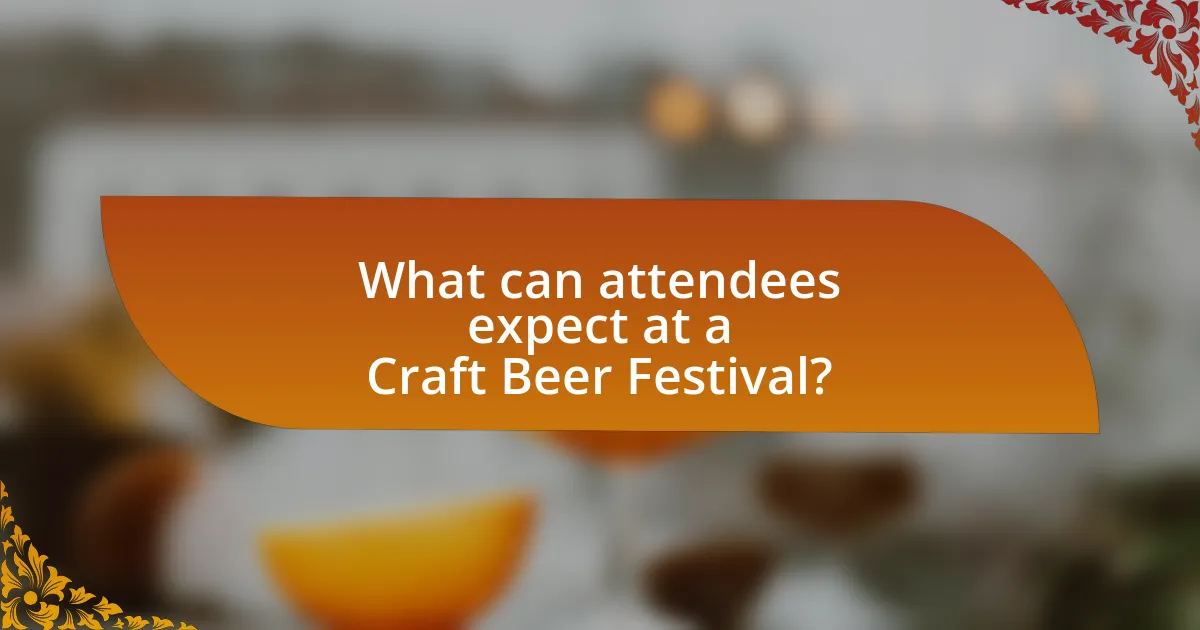
What can attendees expect at a Craft Beer Festival?
Attendees at a Craft Beer Festival can expect a diverse selection of craft beers from local breweries, showcasing unique flavors and styles. These festivals typically feature tastings of various beer types, including IPAs, stouts, and lagers, allowing participants to explore different brewing techniques and ingredients. Additionally, attendees often enjoy food pairings, live music, and opportunities to meet brewers, enhancing the overall experience. Craft Beer Festivals serve as a platform for local breweries to promote their products, contributing to community engagement and support for the craft beer industry.
How is the layout of a typical Craft Beer Festival organized?
The layout of a typical Craft Beer Festival is organized into distinct zones that facilitate the flow of attendees and enhance the tasting experience. These zones typically include a central area for breweries showcasing their beers, designated tasting areas with tables and seating, food vendor sections, and entertainment spaces for live music or activities. This organization allows for efficient movement, ensuring that attendees can easily access different breweries and food options while enjoying the festival atmosphere. Additionally, clear signage and pathways are often implemented to guide participants, contributing to a well-structured event.
What types of booths and vendors are usually present?
Craft beer festivals typically feature a variety of booths and vendors, including local breweries, food trucks, merchandise sellers, and craft-related artisans. Local breweries showcase their unique beer offerings, often providing tastings and information about their brewing processes. Food trucks offer complementary cuisine that pairs well with the craft beers, enhancing the overall experience. Merchandise sellers provide festival-themed items, such as glassware and apparel, while craft-related artisans may sell handmade goods that resonate with the festival’s theme. This diverse range of vendors contributes to the vibrant atmosphere of craft beer festivals, attracting a wide audience and promoting local culture.
How are tasting sessions structured at these festivals?
Tasting sessions at craft beer festivals are typically structured to allow attendees to sample a variety of beers from different local breweries in a designated area. Each session usually features a set number of breweries, each offering a selection of their beers for tasting, often accompanied by information about the brewing process and flavor profiles. Attendees receive a tasting glass and may be provided with a tasting guide that outlines the breweries and their offerings, enhancing the experience by educating participants about the beers they are sampling. This structured approach facilitates organized sampling, encourages interaction with brewers, and promotes a deeper appreciation of craft beer.
What activities and entertainment are featured at Craft Beer Festivals?
Craft Beer Festivals feature a variety of activities and entertainment designed to enhance the experience for attendees. Common activities include beer tastings, where participants sample a wide range of craft beers from local breweries, and brewery tours that provide insights into the brewing process. Additionally, many festivals host live music performances, food pairings with local cuisine, and competitions such as beer judging contests. These elements not only celebrate craft beer but also foster community engagement and support for local businesses.
What types of live performances can attendees enjoy?
Attendees can enjoy various types of live performances at craft beer festivals, including live music, comedy shows, and interactive entertainment. Live music often features local bands and artists, enhancing the festival atmosphere and promoting regional talent. Comedy shows provide a light-hearted entertainment option, while interactive performances, such as brewing demonstrations or beer tastings, engage attendees and educate them about the craft beer process. These performances contribute to the overall experience, making craft beer festivals vibrant community events.
How do workshops and seminars enhance the festival experience?
Workshops and seminars enhance the festival experience by providing attendees with educational opportunities that deepen their understanding of craft beer. These interactive sessions allow participants to learn directly from industry experts about brewing techniques, flavor profiles, and the history of local breweries. For instance, a seminar on beer tasting can improve attendees’ sensory evaluation skills, making their festival experience more engaging and informative. Additionally, workshops often include hands-on activities, such as brewing demonstrations, which foster a sense of community and connection among participants, ultimately enriching the overall atmosphere of the festival.
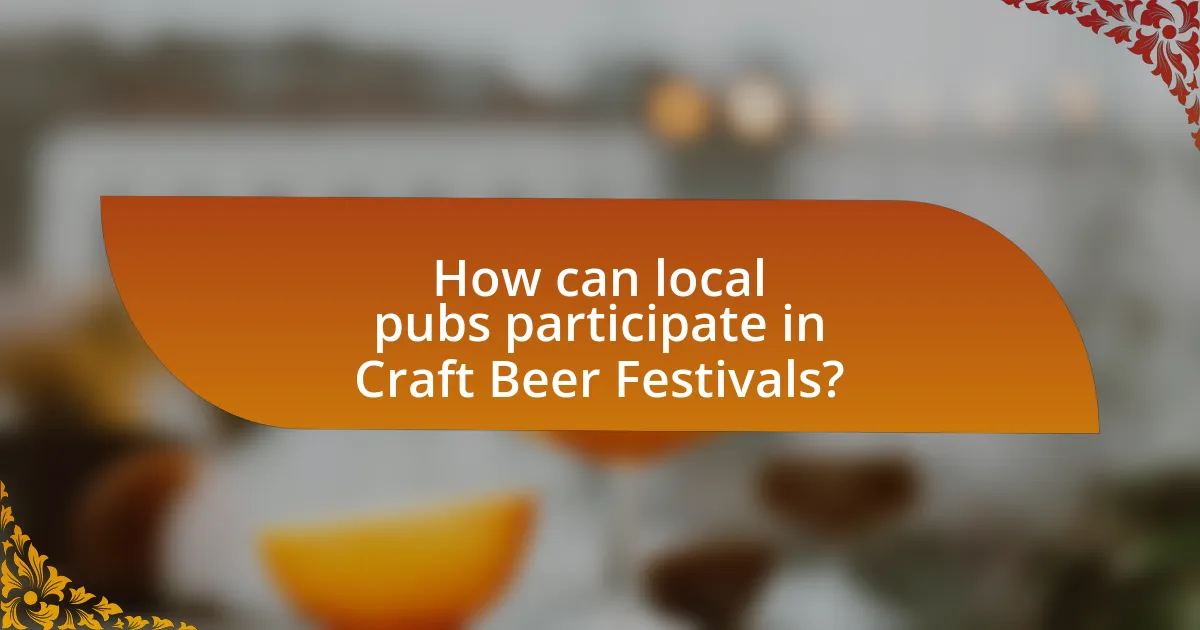
How can local pubs participate in Craft Beer Festivals?
Local pubs can participate in Craft Beer Festivals by collaborating with local breweries to showcase their beers at the event. This collaboration often involves hosting tasting sessions, offering special promotions, and creating unique beer pairings with food. According to the Brewers Association, local breweries benefit from increased visibility and sales during these festivals, while pubs enhance their reputation as community hubs for craft beer enthusiasts. By actively engaging in these festivals, local pubs can attract new customers and strengthen relationships with local breweries, fostering a vibrant craft beer culture in their area.
What are the benefits for local pubs hosting Craft Beer Festivals?
Local pubs benefit significantly from hosting Craft Beer Festivals by attracting a larger customer base and enhancing community engagement. These festivals draw beer enthusiasts and casual drinkers alike, increasing foot traffic and sales during the event. Additionally, they provide an opportunity for local breweries to showcase their products, fostering partnerships that can lead to ongoing collaborations and exclusive offerings. According to a study by the Brewers Association, craft beer festivals can boost local economies by generating revenue for both the pubs and the breweries involved, creating a win-win situation for all parties.
How does hosting a festival attract new customers to local pubs?
Hosting a festival attracts new customers to local pubs by creating a vibrant social atmosphere that draws in attendees seeking entertainment and unique experiences. Festivals often feature local breweries, which enhances community engagement and promotes local products, leading to increased foot traffic in pubs. For instance, a study by the Brewers Association found that craft beer festivals can increase sales for participating breweries by up to 30%, which in turn benefits local pubs that serve these beers. Additionally, the festival environment encourages patrons to explore different offerings, often resulting in higher spending per visit.
What partnerships can local pubs form with breweries for festivals?
Local pubs can form partnerships with breweries for festivals by collaborating on co-branded events, offering exclusive beer selections, and organizing joint marketing campaigns. Co-branded events allow pubs to host brewery-sponsored festivals, enhancing visibility for both entities. Exclusive beer selections can include limited-edition brews or seasonal offerings from the brewery, attracting customers seeking unique experiences. Joint marketing campaigns can leverage social media and local advertising to promote the festival, increasing attendance and engagement. These strategies have been successfully implemented in various regions, demonstrating their effectiveness in boosting local economies and fostering community connections.
What best practices should local pubs follow when organizing a festival?
Local pubs should prioritize community engagement, effective planning, and safety measures when organizing a festival. Engaging the community involves collaborating with local breweries, artists, and vendors to create a diverse and appealing event that reflects local culture. Effective planning includes setting clear objectives, budgeting accurately, and promoting the festival through various channels to maximize attendance. Safety measures, such as crowd control, first aid availability, and compliance with local regulations, are essential to ensure a secure environment for attendees. These practices enhance the festival experience and contribute to its overall success, as evidenced by successful events that attract large crowds and foster community spirit.
How can local pubs effectively promote their Craft Beer Festival?
Local pubs can effectively promote their Craft Beer Festival by utilizing a multi-channel marketing approach that includes social media, local partnerships, and community engagement. Social media platforms like Facebook and Instagram allow pubs to reach a wider audience by sharing event details, engaging visuals, and interactive content, which can increase attendance. Collaborating with local breweries for cross-promotion can enhance visibility, as these breweries can share the event with their customer base. Additionally, hosting pre-festival events or tastings can generate buzz and encourage community involvement. According to a study by the Brewers Association, local events significantly boost foot traffic and sales for participating venues, demonstrating the effectiveness of these promotional strategies.
What logistical considerations must be addressed for a successful festival?
Successful festivals require careful planning of several logistical considerations, including venue selection, crowd management, vendor coordination, and safety measures. Venue selection must accommodate the expected number of attendees, ensuring adequate space for activities and facilities. Crowd management involves creating efficient entry and exit points, as well as pathways to prevent congestion. Vendor coordination is essential for ensuring that local breweries have the necessary resources and space to showcase their products effectively. Safety measures, including first aid stations and security personnel, are critical to address potential emergencies and maintain a secure environment for attendees. These considerations are supported by industry best practices, which emphasize the importance of thorough logistical planning in achieving a successful event.
What tips can enhance your experience at a Craft Beer Festival?
To enhance your experience at a Craft Beer Festival, plan your visit by researching participating breweries and their offerings in advance. This preparation allows you to prioritize which beers to try, ensuring you sample a variety of styles and flavors. Additionally, arrive early to avoid long lines and to have ample time to explore the festival layout. Staying hydrated and consuming food throughout the event is crucial, as it helps maintain your stamina and enhances your tasting experience. Engaging with brewery representatives can provide insights into the brewing process and the unique characteristics of their beers, enriching your understanding and appreciation. Lastly, consider using a tasting notebook to jot down your impressions of each beer, which can help you remember your favorites for future reference.
How should attendees prepare for a Craft Beer Festival?
Attendees should prepare for a Craft Beer Festival by planning their transportation, staying hydrated, and researching the breweries and beers available. Planning transportation ensures safe travel, as many attendees may consume alcohol. Staying hydrated helps mitigate the effects of alcohol consumption, which is crucial for enjoying the festival. Researching breweries and their offerings allows attendees to prioritize their tasting experience, as many festivals feature a wide variety of local craft beers. This preparation enhances the overall experience and ensures responsible enjoyment of the event.
What strategies can help attendees make the most of their tasting experience?
Attendees can enhance their tasting experience by planning their visit, pacing themselves, and engaging with brewers. Planning involves reviewing the festival layout and selecting breweries of interest, which allows for a more focused tasting journey. Pacing oneself is crucial; sampling smaller amounts and taking breaks helps prevent palate fatigue and ensures enjoyment throughout the event. Engaging with brewers provides insights into the brewing process and the unique characteristics of each beer, enriching the overall experience. These strategies are supported by the fact that informed and paced tasting leads to a more enjoyable and memorable festival experience.
